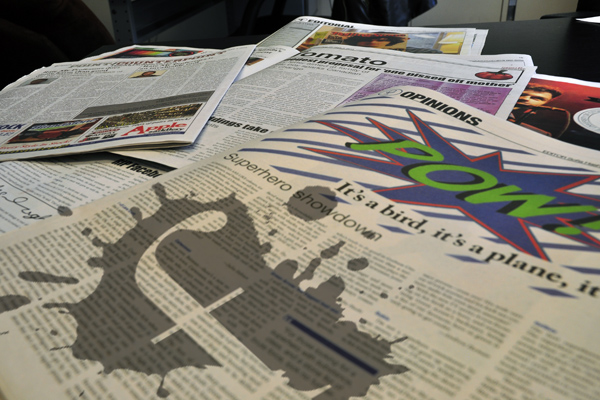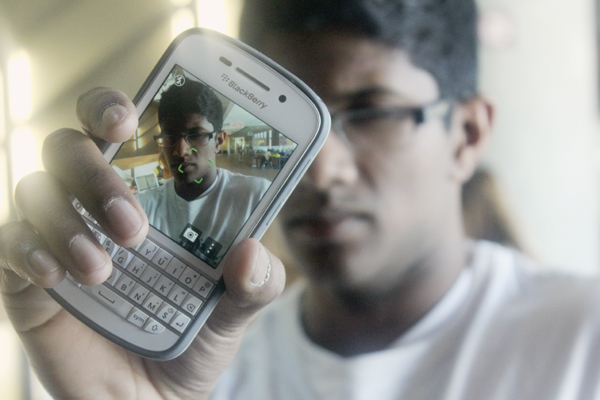Should students be downloading?
It’s not worth it
Jesse Colautti | Fulcrum Staff
BELIEVE IT OR not, downloading is illegal in Canada—and ignorance of this fact or claims of it being a victimless crime aren’t valid defences.
We’ve all heard people justify breaking laws, whether it be jaywalking, drinking a beer on the walk over to the bar, or speeding a few kilometres over the limit. Everyone seems to have an excuse for straying outside the lines of the law every once in a while. But don’t let the lack of guilt confuse you; these folks are breaking the law that, for better or for worse, we as Canadians have agreed to uphold and enforce.
Downloading is no exception.
I understand the rationale for downloading. It saves valuable time and money, and often its immediate victims are hard to find. I also understand that almost everyone reading this paper is a university student, and that right now you are probably the poorest you will ever be. But that doesn’t give you a free pass to steal.
You wouldn’t be able to use that excuse if you were caught stealing a television from Best Buy or a sweater from the mall. Having the theft occur on your own laptop doesn’t change the fact that you are taking something that does not belong to you.
I’m not trying to shame anyone here; I’m probably no more innocent than the rest of us, but it’s high time we call a spade a spade. We ought to acknowledge that what we are doing is wrong. Spare me the moral justification; it’s illegal and punishable up to $5,000.
Many downloaders are comforted by the fact that the only time somebody was sued for downloading in Canada was way back in 2004 and the attempt was unsuccessful. However, a recent lawsuit against Teksavvy, an Internet provider in Southern Ontario, could establish a precedent for film and music companies in Canada to sue thousands of people who use BitTorrent file-sharing programs.
What is even more alarming is that in a Financial Post article focused on the lawsuit, Matthew Braga wrote that Teksavvy “has decided not to oppose the substance of the motion for disclosure of its customers’ names and act on their behalf.”
This means that in future lawsuits, our Internet providers will not defend our names on the basis of confidentiality. It appears downloaders are safe—only for as long as it takes for their Internet provider to go to court.
For students’ own sake, and the sake of their future bank accounts, they need to become conscious about the choice they are making each time they download. The decision to download is no longer private; each click can be tracked and monitored by firms across Canada at any given time and used against you as evidence.
Suddenly the victims of downloading have become much more visible, and they look an awful lot like broke university students.
Downloaders aren’t the problem
Héloïse Rodriguez-Qizilbash | Fulcrum Contributor
WHILE DOWNLOADING MAY not be completely legal, there are many reasons why for the average student it is a perfectly reasonable and ethical choice.
Since kindergarten, we have been taught to be resourceful and independent. So why is the blame put on us, the consumers, when these downloading websites are so easily accessible? Why are we expected to be the only ones acting nobly?
If these websites are so easy for us to find, it’s just as easy for those with legal power to take them down. If they don’t, and they decide to turn a blind eye, it seems legitimate that we enjoy these resources while they last.
The logic used to blame students who download is ridiculous. It would be like expecting a student to ignore a friend’s study notes when cramming for a midterm. Sure, it might be more righteous to study alone, but since when did it become wrong to make things a littler easier for ourselves?
Downloading saves money. I wanted to buy a movie on iTunes this week, but it turns out that it would have cost me $20. If I had to spend that much money on every movie I watched, I wouldn’t be able to afford groceries, textbooks, or tuition. A student lifestyle is expensive, but it shouldn’t force me to miss out on entertainment that every other demographic has access to.
Downloading is the only viable option for students. Maybe a modern classic like The Lord of the Rings is worth dishing out top dollars, but when I just want a funny movie to distract me from an essay for a couple hours, there’s no way I’m going to buy it.
People who oppose downloading will often claim that it causes artists to lose money—stifling careers before they begin. I think this argument is completely false in today’s world. If my friend downloads a song and sends it to me, and I like it and send it to another friend, the song’s exposure will be much larger than if the first person hadn’t shared it.
If we decide that we like a certain song, we may even decide to purchase the whole album later, or buy tickets to that artist’s concert. Artists are still making money; in fact, many make their content available freely for a limited amount of time because it’s a good marketing technique. So how can engaging with an artist’s product be a bad thing?
Downloading is one of the last possible ways for us—as students of the information age—to do something even remotely illegal. Students should be the part of society pushing its boundaries and laws. If all it takes to get us feeling like we’re living on the edge is to download a few songs then I say so what?
Better that than get in fights at the bar, steal from the cafeteria, or race down a highway drunk.







